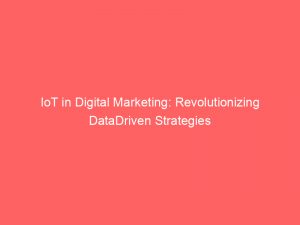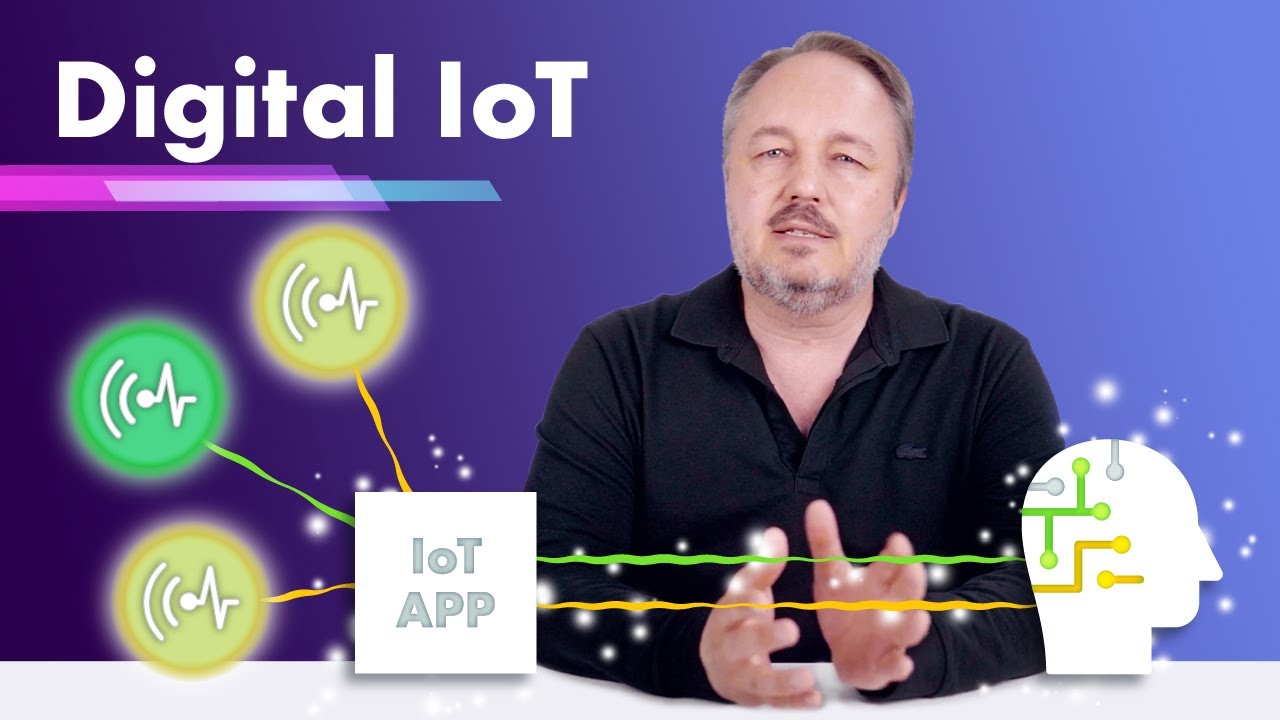- iot in digital marketing
- IoT And Customer Information Gathering
- Impact Of IoT On Search Engines, SEO, And Web Content
- Targeted Advertising With IoT
- Automating Social Media Marketing With IoT
- Job Opportunities In IoT-Driven Digital Marketing
- Shift From Keyword-Based To Intention-Based SEO
- Instant Consumer Feedback With IoT
- Predicting Trends With IoT Data Analysis
In a world driven by technology, the Internet of Things (IoT) has emerged as a game-changing force in every industry, including digital marketing. With its revolutionary capabilities of connecting devices and collecting vast amounts of customerdata, the IoT is transforming how businesses understand and engage with their target audiences.
Imagine a world where ads are tailored precisely to individual preferences, where marketing campaigns can be automated and optimized in real-time, and where customer behavior can be monitored and analyzed to create more effective strategies. Buckle up, because we are about to dive into the fascinating realm of IoT in digital marketing.
| Item | Details |
|---|---|
| Topic | IoT in Digital Marketing: Revolutionizing DataDriven Strategies |
| Category | Ads |
| Key takeaway | In a world driven by technology, the Internet of Things (IoT) has emerged as a game-changing force in every industry, including digital marketing. |
| Last updated | December 28, 2025 |
digital-marketing">iot in digital marketing
IoT, or the Internet of Things, has revolutionized the field of digital marketing by providing new ways for marketers to gather customer information. Through IoT, marketers can collect data from various devices such as smartphones, laptops, TVs, vehicles, and wearables, allowing for a more comprehensive understanding of customer behavior and preferences.
This data can be utilized to create targeted ads, personalize marketing campaigns, and improve product development. Moreover, IoT facilitates the automation of social media marketing processes and enables the delivery of personalized messages.
By leveraging IoT, digital marketers can stay competitive in the ever-evolving landscape of technology-driven marketing.
Key Points:
- IoT has revolutionized digital marketing by enabling marketers to gather customer information from various devices.
- Marketers can collect data from smartphones, laptops, TVs, vehicles, wearables, etc., providing a comprehensive understanding of customer behavior and preferences.
- This data can be used to create targeted ads, personalize marketing campaigns, and improve product development.
- IoT allows for automation of social media marketing processes and the delivery of personalized messages.
- By leveraging IoT, digital marketers can stay competitive in the rapidly changing technology-driven marketing landscape.
Sources
https://gecdesigns.com/blog/role-of-iot-in-digital-marketing
https://iotmktg.com/ways-iot-is-changing-digital-marketing/
https://www.mckinsey.com/featured-insights/mckinsey-explainers/what-is-the-internet-of-things
https://geekflare.com/iot-marketing-strategies/
Check this out:
? Pro Tips:
1. Incorporate IoT data into customer personas: Use the data collected from IoT devices to create more accurate and detailed customer personas, allowing for more targeted marketing strategies.
2. Leverage IoT for location-based advertising: Utilize IoT devices to track customer locations and deliver personalized advertisements based on their vicinity to your business or specific points of interest.
3. Utilize IoT in influencer marketing: Partner with influencers who have a strong IoT presence, such as popular tech bloggers or social media personalities who regularly review smart devices, to promote your brand to their engaged audience.
4. Implement IoT in customer service: Use IoT devices to improve customer service by enabling real-time feedback, instant troubleshooting, and personalized recommendations based on customer preferences and behaviors.
5. Explore partnerships with IoT device manufacturers: Collaborate with IoT device manufacturers to create joint marketing campaigns or exclusive product bundles to tap into their existing customer base and expand your reach in the IoT market.
IoT And Customer Information Gathering
With the rise of the Internet of Things (IoT), marketers are now able to collect customer information in innovative and efficient ways. IoT devices, such as smartphones, laptops, TVs, vehicles, and wearables, have become integral parts of people’s lives, generating vast amounts of data that can be harnessed for digital marketing purposes.
This wealth of customer information allows marketers to gain deeper insights into customer behavior and preferences, enabling them to deliver more personalized and targeted marketing campaigns.
The use of IoT in digital marketing has revolutionized the way customer data is collected and analyzed. Previously, marketers relied heavily on traditional methods such as surveys and focus groups to gather information.
However, with IoT devices, data is collected in real-time, providing marketers with up-to-date and accurate insights into customer preferences and buying behavior. This real-time data allows marketers to make informed decisions and create more effective marketing strategies.
Impact Of IoT On Search Engines, SEO, And Web Content
The advent of IoT has had a profound impact on search engines, search engine optimization (SEO), and web content. Traditionally, SEO was based on keyword optimization, where marketers would focus on using specific keywords to improve search engine rankings.
However, with the rise of IoT, there has been a shift towards intention-based writing. Instead of focusing solely on keywords, marketers now need to understand the intent behind customer searches and create content that aligns with their needs.
IoT devices, such as voice assistants and smart speakers, have changed the way people search for information. These devices allow users to conduct voice searches, which tend to be more conversational and long-tail in nature.
As a result, marketers need to create content that answers specific questions and provides valuable information to meet the needs of voice search users. This shift towards intention-based writing has forced marketers to optimize their web content accordingly and ensure it aligns with the changing search landscape.
Targeted Advertising With IoT
One of the significant advantages of IoT in digital marketing is the ability to target ads more specifically for certain market sectors. With IoT devices becoming integrated into various aspects of people’s lives, marketers now have access to a wealth of data that can be used to create highly targeted advertising campaigns.
By analyzing the data collected from IoT devices, marketers can gain insights into customer behavior, preferences, and interests, allowing them to craft personalized ads that resonate with their target audience.
IoT-enabled targeted advertising goes beyond demographic and geographic segmentation. Marketers can now leverage real-time data to target customers based on their specific interests, online behavior, and even their physical location.
For example, a retail store can use IoT to send personalized offers and promotions to customers who are in close proximity to their physical store. This level of targeted advertising not only improves customer engagement but also increases the likelihood of conversions and sales.
Automating Social Media Marketing With IoT
IoT also plays a significant role in automating social media marketing processes and enabling personalized ads. With the vast amount of data generated by IoT devices, marketers can automate social media campaigns and deliver personalized content to their target audience.
IoT devices provide real-time data on customer preferences, which can be used to tailor marketing messages and promotions.
Furthermore, IoT devices allow marketers to gather data on customer behavior across various digital channels, such as social media platforms, websites, and mobile apps. This data can then be used to create customer profiles and deliver personalized ads and content based on individual preferences and interests.
By automating social media marketing processes and delivering personalized ads, marketers can significantly improve customer engagement and increase the likelihood of conversions.
Job Opportunities In IoT-Driven Digital Marketing
The rise of IoT has also created numerous job opportunities in the field of digital marketing. As companies increasingly rely on IoT to gather and analyze customer data, the demand for professionals with expertise in IoT-driven digital marketing strategies continues to grow.
Roles such as IoT marketing strategists, data analysts, and automation specialists are becoming increasingly important in today’s digital marketing landscape.
Digital marketing professionals who can understand and leverage IoT data to create effective marketing strategies are in high demand. These professionals need to be skilled in data analysis, customer segmentation, and personalization techniques.
The ability to extract actionable insights from IoT data and translate them into targeted marketing campaigns is crucial for businesses looking to stay ahead of the competition in the IoT era.
Shift From Keyword-Based To Intention-Based SEO
As mentioned earlier, the rise of IoT has led to a shift from keyword-based SEO to intention-based writing. Traditional SEO focused on optimizing web content for specific keywords to improve search engine rankings.
However, with the increasing use of IoT devices and voice search, the way people search for information has changed.
Voice search queries tend to be more conversational and long-tail, requiring marketers to create content that answers specific questions. This shift towards intention-based SEO means marketers need to understand the intent behind customer searches and optimize their web content accordingly.
By aligning their content with customer needs and preferences, marketers can improve their chances of ranking higher in voice search results and attracting organic traffic.
Instant Consumer Feedback With IoT
One of the significant advantages of IoT in digital marketing is the ability to gather instant consumer feedback. IoT devices enable companies to collect feedback from customers in real-time, allowing them to make immediate improvements to their products or services.
This real-time feedback loop provides valuable insights for product development and helps businesses to stay ahead of changing consumer preferences.
For example, IoT-enabled devices can track how customers interact with a product and collect data on usage patterns and user behavior. This data can then be analyzed to identify areas for improvement and innovation.
By leveraging IoT to gather instant consumer feedback, businesses can enhance their products and services, ultimately increasing customer satisfaction and loyalty.
Predicting Trends With IoT Data Analysis
IoT data analysis plays a crucial role in understanding customer expectations, improving product quality, and predicting future trends. The vast amount of data generated by IoT devices allows marketers to analyze customer buying behavior, preferences, and trends.
By analyzing this data, marketers can identify patterns and make data-driven decisions to drive their marketing strategies.
Predictive analytics, powered by IoT data analysis, enables marketers to forecast future trends and anticipate customer needs. By understanding customer preferences and behavior, businesses can stay ahead of the curve and develop innovative marketing campaigns that align with emerging trends.
IoT data analysis provides valuable insights into customer behavior and allows marketers to deliver more effective marketing campaigns that resonate with their target audience.
In summary, the integration of IoT in digital marketing has revolutionized the way customer information is collected, analyzed, and utilized. From targeted advertising and automation to personalized content and predictive analytics, IoT has transformed the digital marketing landscape.
Marketers who embrace IoT and leverage its capabilities are able to create more engaging and effective marketing campaigns, stay ahead of the competition, and drive business growth.











